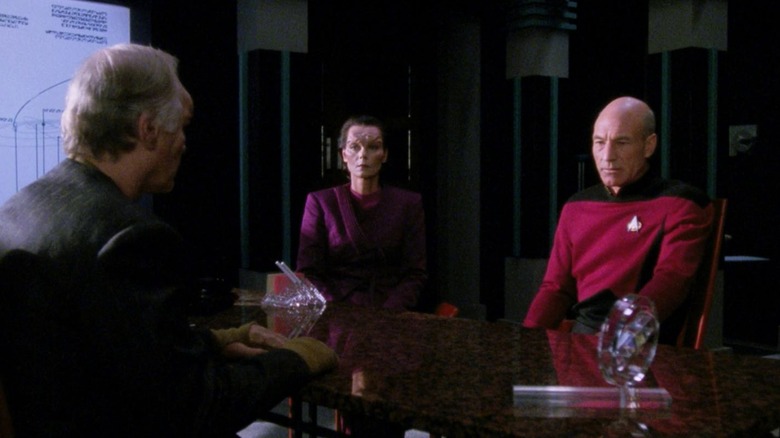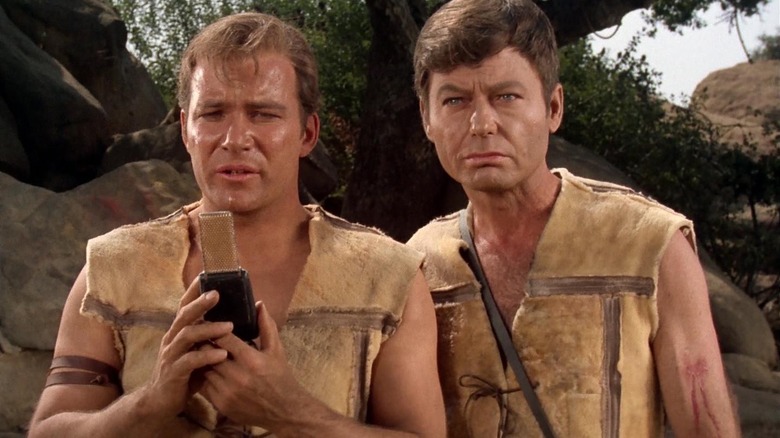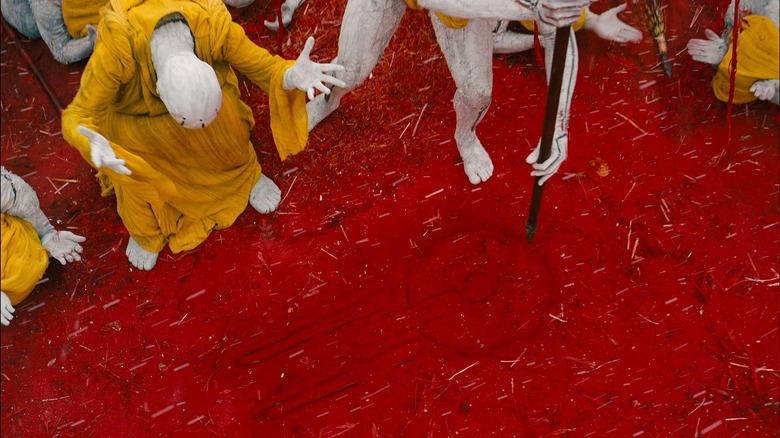Star Trek's Prime Directive Had A Grim Real-Life Inspiration
One of the central tenets of "Star Trek," as anyone might be able to tell you, is the Prime Directive. Federation starships may galavant around the galaxy at the discretion of Starfleet, but it's not the Wild West. When a Starfleet vessel comes across an alien world that hasn't yet developed faster-than-light travel, for instance, they are forbidden from interacting with them at all. An alien species, by Starfleet's philosophy, must be ready to enter the intergalactic community by their own travel innovations before they can be made aware of the existence of aliens. This stems from the Prime Directive, which forbids Starfleet from interfering with any world's natural development.
The Prime Directive also forbids Starfleet from making any major societal changes to any world. If, for instance, the Federation were to give widespread replicator technology to a planet that hadn't ever seen the technology before, it would dramatically alter their society, and that is to be avoided at all costs. However, the Prime Directive becomes sticky when a Federation starship encounters widespread exploitation or slavery on an alien world. The Enterprise is perfectly capable of overpowering the local government and ending slavery, but the Federation demands that the planet be left to its own devices; they have to rid the world of slavery themselves.
While this may seem unfair, understand that it is an anti-colonialist measure. It isn't Starfleet's job to sail around the galaxy, imposing its will on others and forcing them to live by our own standards.
The Prime Directive, according to the book "The Fifty-Year Mission: The Complete, Uncensored, Unauthorized Oral History of Star Trek: The First 25 Years" edited by Mark A. Altman and Edward Gross, was invented by "Star Trek" writer Gene L. Coon as a direct response to the war in Vietnam.
Vietnam and Star Trek
In the "Star Trek" episode "A Private Little War" (February 2, 1968), written by show creator Gene Roddenberry, a short criticism of the Vietnam War was clearly dramatized. Kirk (William Shatner) encountered a blissful, agrarian species who had, against all logic, been fighting a tribal war with flint-lock rifles, a technology they were centuries away from being able to develop. Kirk discovered that a rogue Klingon (Ned Romero) had been supplying the guns to the locals as a way of exacerbating a civil war and wiping out half of the planet's population. This led to Kirk facing an ethical dilemma over the Prime Directive. Should he back off and let the Klingon do his dastardly plan, or should he further advance the violence by providing guns for the unarmed side? The ending of the episode is ambiguous. The phrase "balance of power" is used, with Kirk even alluding to certain 20th century conflicts in Asia. Dr. McCoy (DeForest Kelley) argues that weapons should not be distributed.
One can clearly see that this is a metaphor for the escalation of violence in Vietnam, a messy, deathly quagmire that the United States fouled up beyond all recognition. Indeed, early drafts of the script for "A Private Little War" were even more explicit about its allusions to Vietnam.
Gene L. Coon, a longtime "Star Trek" writer, is credited with inventing the Prime Directive, as stated in "The Fifty-Year Mission." Many feel that Coon and Roddenberry were responding to the Vietnam War, which was still being fought at the time. America was still trying to enforce its colonial will on distant nations by influencing what was essentially a civil war. Coon and Roddenberry likely wanted to show that, in the future of "Star Trek," those colonialist impulses were — once and for all — at an end.
Star Trek has often found loopholes in the Prime Directive
As a writing device, the Prime Directive can be a little iffy. While one can appreciate that Coon and Roddenberry wanted to rid the future of colonialism, they didn't quite think out the details. Surely, the argument goes, any interaction with any species, even warp-capable species with good intentions, is an influence on their societal development. While there may be some in-universe Starfleet statutes that clarify the exact limits of the Prime Directive, those statutes haven't been stated in any "Star Trek" dialogue.
The broader examples, of course, audiences can see right away. At the beginning of the 2013 film "Star Trek Into Darkness," for instance, the U.S.S. Enterprise is spotted in the sky by a species of agrarian-level aliens. They immediately draw a picture of the ship, not knowing what it is. It's implied that their entire faith and belief system would be altered by the Enterprise. That's a prime, uh, Prime Directive violation, right there.
Kirk also famously violated the Prime Directive when he found people in bondage. Notably, in the "Star Trek" episode "The Return of the Archons" (February 9, 1967), Kirk frees a colony from the psychic influence of a powerful, brainwave-altering computer. That might arguably have been for the better, but it certainly counts as societal interference. "Archons," incidentally, was the first time the Prime Directive was mentioned in "Star Trek." Throughout the various shows, the Directive was broken or bent multiple times, usually to better the lives of the locals or to get the Federation out of a scrape.
It may not be as Prime as all that.


